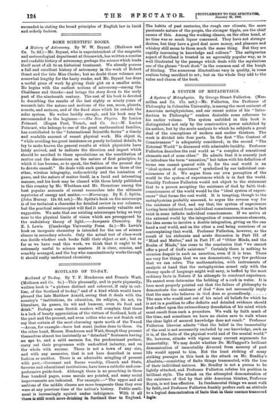A SYSTEM OF METAPHYSICS.
A System of Metaphysics. By George Stuart Fullerton. (Mac- millan and Co. 17s. net.)—Mr. Fullerton, the Professor of Philosophy in Columbia University, is among the most eminent of American metaphysicians, and our recent notice of his "Intro- duction to Philosophy" renders desirable some reference to his earlier volume. The system unfolded in this book is distinguished not only by the constructive power exhibited by its author, but by the acute analysis to which he subjects a great deal of the conceptions of modern and earlier thinkers. The work is divided into four parts. In the first "The Content of Consciousness" is adequately considered; in the second "The External World" is discussed with admirable lucidity. Professor Fullerton describes the real world as "a complex of sensational elements and of none other." He admits that it is scarcely just to introduce the term "sensation," but taken with his definition of terms one cannot quarrel with it, for the real world is an "ideal system of experiences" symbolised by our individual con- sciousness of it. We argue from our own perception of the world to the system of experiences which is in fact the world. Possibly Professor Fullerton would not object to the statement that to a person accepting the existence of God by faith God- consciousness of the world would be the "ideal system of experi- ences" that forms the real world. It is tempting, though to tho metaphysician probably unsound, to argue the reverse way for the existence of God, and say that, the system of experiences having been inferred from individual consciousness, it must in fact exist in some infinite individual consciousness. If we arrive at the external world by the integration of consciousness-elements, the idea seems to involve a double integration, giving on the one hand a real world, and on the other a real being conscious of or contemplating that world. Professor Fullerton, however, as the result of his elaborate and acute discussion in Part III. of "Mind and Matter," and in Part IV. of "Other Minds, and the Realm of Minds," has come to the conclusion that "we cannot offer a proof of God's existence." Certainly there is nothing to occasion despair in such an assertion, even if it is true. There are very few things that we can demonstrate, very few problems that we can solve. The mathematician, with instruments of analysis at hand that the metaphysician armed only with the clumsy spade of language might well envy, is baffled by the most ordinary facts in Nature if he attempts to construct experience. He cannot even determine the bobbing of a cork in water. It is here most properly pointed out that the failure of philosophy to demonstrate the existence of God "does not necessarily imply that the man who believes in God does so groundlessly The man who would cast out of his mind all beliefs for which he is not in a position to offer definite and detailed evidence should first reflect upon the extraordinary denudation of his mind which must result from such a procedure. We walk by faith much of the time, and sometimes we have no choice save to walk where the clear light of assured knowledge does not reach." Professor Fullerton likewise admits "that the belief in the immortality of the soul is not necessarily excluded by our knowledge, such as it is, of the facts of the physical world and of the mental world." He, however, attacks with vigour many current arguments for immortality. We may doubt whether Dr. MeTaggart's brilliant demonstration of immortality divorced from memory of past life would appeal to him. Not the least striking of many striking passages in this book is the attack on Mr. Bradley's Absolute,—consisting of finite things transmuted, with the loss of their individual natures. Mr. Bradley is not a person to be lightly attacked, and Professor Fullerton refutes his position in brilliant style. The attack on the attempted demonstration of the existence of God by that able American thinker, Professor Royce, is not less effective. In fundamental things we must walk by faith, and Professor Fullerton frankly prefers such an attitude to a logical demonstration of facts that in their essence transcend ,logic.




















































 Previous page
Previous page